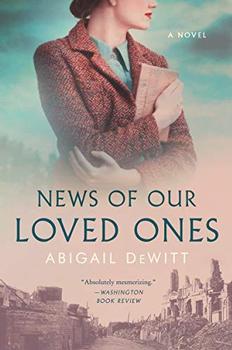Reading Guide Questions

Please be aware that this discussion guide will contain spoilers!
- The novel begins with an epigraph from Tim O’Brien: “To go home, one must become a refugee.” What is a proper definition of home? How is this paradoxical idea relevant to the experiences of the many characters throughout the novel?
- Sensitive, teenaged Yvonne, in the midst of her physical hunger and her longing for a boy on a bicycle, believes that “pleasure and fear [are]...alike.” In what ways is this true?
- Growing up in wartime imparts a very real awareness that “we might die today.” How does this profound knowledge affect Yvonne and other characters? Is there a way such threat could be valuable?
- At seven years old, Geneviève is punished for being frightened when a woman is hit by a car. Her mother scolds her: “Fear is a form of selfishness.” What does this mean? To what extent is it true or not? Does this change in a time of war?
- What psychological and behavioral effects do the deprivation and losses of the war have on the different characters when they are young and as they grow up?
- Tante Chouchotte teaches literature and characters like Marie-Claire always have “a stack of books shoved under one arm.” What is the importance of books and literature during the war? What is the role of storytelling in life? What might it mean that “salvation depends on the right story”?
- In what ways are Mathilde and her son Marcel different? Why are they so compelling to Marie-Claire? What might Mathilde’s exclamation that being in a snowstorm is “like being in the mind of a mad-man” suggest about her?
- When Marie-Claire hears rumors of the French resistance movement she feels “an electrified awareness of the world.” What might this mean? What is its value? In what other ways might someone achieve such awareness?
- Later in her life, Marie-Claire comes to believe that “we never know how other people suffer.” In what ways is this true or not? What are the limits of empathy? How is intimacy and connection achieved despite such limited understanding of another?
- Mathilde’s father blames Mathilde for his sexual aggression to groped by her father on the beach. Is there any difference between the way Mathilde’s father treats her in the 1920s and the way the unnamed father on the beach treats his daughter in 1976?
- In general, what does the novel suggest about French and American attitudes toward gender and sex over the course of the 20th century?
- Even “The Jew & the German,” which is about two men, is told from a girl’s point of view. What is the effect of the author’s decision to tell a war story exclusively through the eyes of women and girls?
- Posing as a gentile painter, Dr. André Naquet, hearing of the arrest of his brother by the Germans, chooses to paint a picture of a marigold rather than flee. Why might he have done this? What is the role of art—personally or culturally—during times of war or oppression?
- Thinking back on his resistance efforts, Dr. Naquet wonders, “What good is a single munitions train and a few lost pamphlets?” How were these efforts valuable despite his belief that he “made no dent in [the] war”?
- Haunted by her survival, “memory floats through [Françoise] like ash.” How is this an apt simile? What is the healthiest way to respond to memories of trauma? What are the costs or benefits of forgetting?
- Playing the violin literally saves Geneviève’s life. What might the role of music be in a good, healthy life?
- After a single generation, the children of war survivors cannot fathom the profound suffering their relatives experienced. In what ways is it possible or not to teach new generations about the horrors of war?
- Polly learns early to tell lies. Why is this? How is it of value? What’s the difference between a lie and a fictional story?
- Polly experiences a powerful “language of dislocation.” What is this?
- Staying with her aunts in France, Polly is told “nothing since the war is worth crying over.” In what ways is this absolute approach to suffering harmful?
- The novel ends with Geneviève and Rémy lying in bed. Geneviève thinks, “it’s enough to feel your old body in my arms, my old body in yours.” In what ways is this valuable to them both? What else might be helpful, perhaps necessary, to heal from the traumas of war?
Unless otherwise stated, this discussion guide is reprinted with the permission of Harper Perennial.
Any page references refer to a USA edition of the book, usually the trade paperback version, and may vary in other editions.

 Book Reviewed by:
Book Reviewed by:



